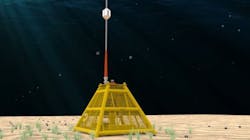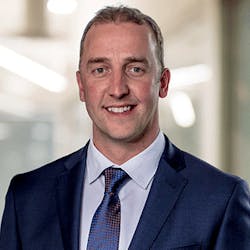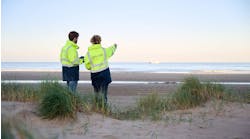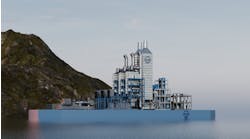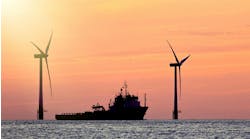ADIPEC 2023: Offshore CCS monitoring helps support long-term integrity of developments
By Ariana Hurtado, Editor and Director of Special Reports
Aquaterra has been increasing its presence and services in the Middle East region. Earlier this week at ADIPEC 2023, Aquaterra Energy announced its partnership with PROGTECH Services to develop intelligent offshore engineering solutions in the Middle East, with a focus on increasing local content, upskilling and knowledge sharing.
This news follows the multi-million UAE decommissioning contract announced in late June. Aquaterra and a major Abu Dhabi-based operator, working in partnership with TPMC, will provide offshore riser equipment and services for the decommissioning of eight wells in 80 m water depth offshore Abu Dhabi by 2028.
In this Q&A, James Larnder, managing director with Aquaterra Energy, explained to Offshore how the company's new CO2 monitoring technologies are helping support the CCS goals of the industry.
"Operators need supply chains that can help them maintain high safety and environmental standards, meet their production targets, reduce costs, and support the development of local content and expertise," he said. "We have seen a growing movement toward the international service market to fulfill these needs, and there are huge opportunities here."
OFFSHORE: What is the offshore energy sector's need for Aquaterra Energy’s new CCS tools?
LARNDER: As the offshore sector seeks to rapidly scale up CCS projects, there is an urgent need for intelligently engineered tools and solutions like ours, which can help deliver on this ambition. There are vast targets in place to hit net-zero goals on a global scale, and the offshore sector has a large part to play. The North Sea Transition Authority has recently awarded 20 carbon storage licenses at offshore sites to meet UK government targets, with the UAE also announcing the doubling of its CCS target for 2030.
Safe, compliant and efficient tools, such as our CCS monitoring system, will be needed to help develop these projects, which are inherently challenging, for example, involving high pressures and low temperatures in subsea environments.
OFFSHORE: How did the company develop its new CO2 monitoring platform?
LARNDER: Our CO2 monitoring platform was initially devised and developed in response to identifying an industry need for long-term CO2 specific monitoring technology. When it comes to storing captured CO2 under the sea, it’s crucial that operators have confidence that stored gas is migrating and remaining in place as expected. The availability of comprehensive monitoring is also essential to reassure the public and regulators of the viability of CCS. With this in mind, we set out to develop a solution that can enable strict storage standards.
The solution was developed to encompass the monitoring of subsurface fiber-optic seismic arrays and the detection of dissolved CO2 gas through self-powered means such as solar or wave energy. We have incorporated dissolved gas sensors to enable a reactive alarm system that identifies CO2 leaks into the water column. These sensors, coupled with data on gas percentages, current conditions and node locations, pinpoint the leak's location and extent. The data are swiftly transmitted via satellites for analysis, enabling rapid action to be taken if there are any issues.
OFFSHORE: How did the company develop the new completions and workover system that supports CCS developments?
LARNDER: To support the CCS goals of the industry and our clients' project requirements, we developed a specifically designed completions and workover system to meet these needs. CCS projects face a number of unique challenges that can occur when working with stored and pressurized CO2, and it’s critical that operators can have peace of mind that there is no risk of gas leakage due to insufficient equipment.
The technology is specifically designed to address challenges, such as sweet corrosion to ultra-low temperatures, that standard low-alloy carbon steels can’t safely deal with. Based upon our completion and workover riser system and AQC-CW connector, we have extended the system design and completed rigorous testing to ensure the system is fully CCS ready. The technology is manufactured in strict accordance with ISO13628-7 and is deployable from a jackup, semisub or lightweight intervention vessel.
OFFSHORE: What are the full range of benefits that minimum facility offshore platforms offer to operators within the Middle East?
LARNDER: Minimum facility and modular platforms can offer huge benefits to operators in the region. Taking this approach, platforms can be adjusted not only to the needs of the specific project but can save up to 30% in steel weight over traditionally designed jackets. This means regional local content requirements can be satisfied by using the vast array of fabrication facilities in the region while also slashing transport-related emissions that would be created by importing a platform or componentry from elsewhere. Emissions can be reduced even further if these materials are sourced in-region—at a time where the Middle East is also being touted as a potential hub for the nascent green steel industry.
Combining new technologies with the modular mindset described above can also open a range of new applications to meet the Middle East’s renewable goals. Platforms can be decked out to function as CO2 injection platforms, tailored to the size and scale of each project. Alternatively, electrolysis technology can be integrated into platforms to efficiently produce green hydrogen, providing further flexibility to operators.
10.05.2023
